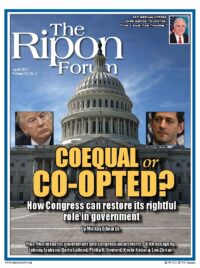A powerful – and politically divisive – engine of growth
 International trade is a powerful driver of economic growth. It introduces competition, inspires innovation, and results in productivity gains which improve our standard of living. However, it has become a particularly contentious issue in the United States.
International trade is a powerful driver of economic growth. It introduces competition, inspires innovation, and results in productivity gains which improve our standard of living. However, it has become a particularly contentious issue in the United States.
In 2009, 57 percent of Republicans believed that trade agreements were good for the nation. That number has since plummeted to 24 percent, with 68 percent of Republicans opposing U.S. trade agreements. This shift was undoubtedly propelled by the 2016 presidential election.
President Donald Trump has been especially vocal about his disdain for U.S. trade policy. During his campaign, he vehemently condemned the North American Free Trade Agreement (NAFTA). He also asserted that “globalization has wiped out our middle class.” He has since taken significant steps toward fulfilling his campaign pledges.
First, he immediately withdrew the United States from the Trans-Pacific Partnership (TPP), a U.S. trade agreement with 11 nations in the Asia Pacific. He also plans to begin renegotiating NAFTA later this year. Furthermore, President Trump met with President Xi of China this month to discuss bilateral trade.
It is evident that the President is committed to making trade policy a priority. However, his actions and rhetoric thus far have been largely misguided. To ensure a prosperous American economy, we must embrace the comprehensive, widespread benefits of open trade.
It is evident that the President is committed to making trade policy a priority. However, his actions and rhetoric thus far have been largely misguided.
International trade spurs international competition, which results in the creation of higher-quality, lower-priced goods and services. This benefits consumers by increasing the availability of valuable products at low prices. It also benefits producers: over half of all imports are used by American manufacturers in the production of final goods. These imports lower the cost of production, which also enables U.S. businesses to sell goods at lower prices.
Increasing trade barriers, on the other hand, disproportionately hurts the poor. A study released earlier this year found that current U.S. tariffs raise the tax burden for lower-income households substantially more than for middle- and high-income households. This is because poorer households tend to spend a larger share of their income on traded goods, and increasing tariffs increases the costs of these goods. The tax burden is highest on single parents and families with children.
The President has been particularly outspoken about using trade barriers to encourage domestic manufacturing, protect domestic industries like steel, and prevent job losses due to trade. However, the vast majority of the decline in U.S. manufacturing employment has been triggered by advances in automation and productivity. This explains why manufacturing output in the United States has continued to rise even while the number of manufacturing workers has decreased.
The impact of trade on jobs is similarly misunderstood. When a country opens itself to trade, international competition leads to specialization. This means that American firms start producing the best products they can for the lowest costs. The natural result of specialization is labor market shifts; some jobs will be displaced while new jobs are created in emerging sectors of the economy. But specialization also increases U.S. productivity, which generates economic growth. This growth is estimated to boost U.S. household income by $13,600 per year.
More than one in every five jobs is supported by international trade and nearly five million jobs were created as a direct result of NAFTA.
There is no denying that labor market shifts can be painful. However, less than one percent of all job separations in the United States are due to import competition. Alternatively, more than one in every five jobs is supported by international trade and nearly five million jobs were created as a direct result of NAFTA. Exports generate jobs by increasing demand for U.S. products, while imports generate jobs by increasing the purchasing power of consumers, reducing input costs for businesses, and generating additional economic activity.
Engaging in international trade is also in the strategic interest of the United States. Trade agreements encourage international cooperation, strengthen relationships with our allies, and bolster U.S. leadership and economic influence around the globe. This is why numerous secretaries of state and defense, foreign ambassadors, and other political leaders have fought for the implementation of trade agreements like the Trans-Pacific Partnership.
President Trump is committed to negotiating only bilateral trade agreements. However, there is no evidence that bilateral trade agreements produce better economic results than multilateral agreements. To the contrary, regional negotiations have resulted in greater market access for U.S. exporters than bilateral deals. Furthermore, TPP countries are determined to move forward without the United States. The United States will continue to miss out on opportunities for multilateral cooperation as long as it is confined to bilateral trade negotiations.
Trade is a powerful engine of growth. It expands market access for producers, lowers costs for consumers, and produces invaluable productivity and efficiency gains which stimulate economic growth. While it is not surprising that public opinion has taken a turn, the best trade policy President Trump can pursue to improve the lives of the American people is to eliminate trade barriers at home and abroad.
Jacqueline Varas serves as a Director of Immigration and Trade Policy at the American Action Forum.




